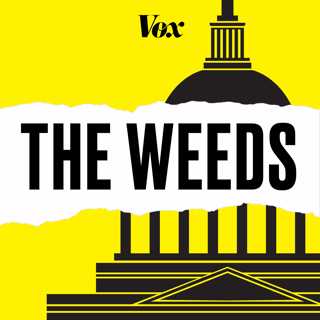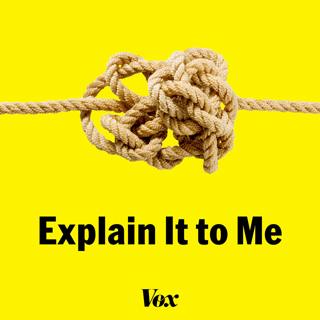
How corporations got all your data
Sean Illing speaks with Matthew Jones, historian of science and technology, and co-author (with data scientist Chris Wiggins) of the new book How Data Happened. They discuss the surprisingly long history of data from the 18th century to today, in service of explaining how we wound up in a world where our personal information is mined by giant corporations for profit. They talk about how the allure of measurement and precision spread from astronomy to the social sciences, why advertising became so bound to the operation of the internet, and how we can imagine a more democratic future for us and our data, given the unprecedented power of today's tech companies. Host: Sean Illing (@seanilling), host, The Gray Area Guest: Matthew L. Jones (@nescioquid), author; James R. Barker Professor of Contemporary Civilization, Columbia University References: How Data Happened: A History from the Age of Reason to the Age of Algorithms by Chris Wiggins and Matthew L. Jones (W.W. Norton; 2023) "How Alan Turing Cracked The Enigma Code" (Imperial War Museum) Manufacturing Consent: The Political Economy of the Mass media by Edward S. Herman and Noam Chomsky (1988) "The manipulation of the American mind: Edward Bernays and the birth of public relations" by Richard Gunderman (The Conversation; July 9, 2015) On Herbert Simon (The Economist; Mar. 20, 2009) The Age of Surveillance Capitalism by Shoshana Zuboff (Profile; 2019) Jeffrey Hammerbacher quoted in "This Tech Bubble Is Different" by Ashlee Vance (Bloomberg Businessweek; Apr. 14, 2011) Enjoyed this episode? Rate The Gray Area ⭐⭐⭐⭐⭐ and leave a review on Apple Podcasts. Subscribe for free. Be the first to hear the next episode of The Gray Area. Subscribe in your favorite podcast app. Help keep this show and all of Vox's journalism free by making a gift to Vox today: bit.ly/givepodcasts This episode was made by: Producer: Erikk Geannikis Engineers: Patrick Boyd & Brandon McFarland Editorial Director, Vox Talk: A.M. Hall Learn more about your ad choices. Visit podcastchoices.com/adchoices
11 Apr 202353min

Do assault weapons bans work?
After the shooting at the Covenant School in Nashville in late March, President Biden once again called for reinstating the federal assault weapons ban. The United States banned new sales of assault weapons from 1994 to 2004, but the law was easy to skirt, and the data we do have about its effectiveness is complicated. Is an assault weapons ban where advocates should spend their political capital? References: America's unique, enduring gun problem, explained The Secret History of Guns Gun Policy in America | RAND Credits: Jonquilyn Hill, host Sofi LaLonde, producer Cristian Ayala, engineer A.M. Hall, editorial director of talk podcasts Help keep this show and all of Vox's journalism free by making a gift to Vox today: bit.ly/givepodcasts Learn more about your ad choices. Visit podcastchoices.com/adchoices
4 Apr 202343min

Medicaid’s “Great Unwinding”
On April 1, 2023, a Covid-era Medicaid policy called continuous enrollment will end. The policy allowed recipients to retain their benefits, even if they were no longer eligible, throughout the federal public health emergency and prevented lapses in coverage. Now that that’s coming to an end, state Medicaid offices need to audit their enrollees. But that process isn’t so simple, and millions are expected to slip through the cracks. Vox senior correspondent Dylan Scott (@dylanlscott) explains. References: Millions of people are about to get kicked off Medicaid Our Welfare Puritanism : Democracy Journal Subscribe to the VoxCare newsletter Credits: Jonquilyn Hill, host Sofi LaLonde, producer Cristian Ayala, engineer A.M. Hall, editorial director of talk podcasts Want to support The Weeds? Please consider making a donation to Vox: bit.ly/givepodcasts Learn more about your ad choices. Visit podcastchoices.com/adchoices
28 Mars 202346min

Why Illinois wants to end cash bail
This month, the Illinois Supreme Court heard oral arguments in a case examining the Safe-T Act. The legislation would bring sweeping reform to the state’s criminal justice system, but one policy in particular has caught the eye and the ire of prosecutors: the elimination of cash bail. Proponents say ending cash bail bonds will get rid of inequities that favor the rich; opponents say it will lead to a rise in crime. What does the fight over cash bail in Illinois tell us about criminal justice in America? References: Season 4 of WBEZ’s Motive podcast Safe-T Act and cash bail goes before Illinois Supreme Court | WBEZ Chicago The Chicago Community Bond Fund I Was Locked Away from My Children for 14 Months Because I Couldn't Make Bail The Lifeline and 988 Guests: Lavette Mayes Shannon Heffernan (@shannon_h) Insha Rahman Credits: Jonquilyn Hill, host Sofi LaLonde, producer Cristian Ayala, engineer A.M. Hall, editorial director of talk podcasts Want to support The Weeds? Please consider making a donation to Vox: bit.ly/givepodcasts Learn more about your ad choices. Visit podcastchoices.com/adchoices
21 Mars 202352min

The debt ceiling drama
You’ve probably heard by now that President Joe Biden released his 2024 budget proposal. You’ve also probably heard that it has almost no chance of passing through both chambers of Congress. What is likely to come to pass is more drama over a recurring problem: the fight over the debt ceiling. If the US doesn’t raise the ceiling and defaults on its debt, financial catastrophe would ensue. What does that mean for the country’s fiscal future? References: What’s in Biden’s new White House budget - Vox Biden’s billionaire tax proposal, explained - Vox House Republicans are taking steps to prepare for a possible debt ceiling default - Semafor President's Budget | OMB | The White House Guests: Joseph Zaballos-Roig (@josephzeballos) Kathleen Day (@kathleenday) Credits: Jonquilyn Hill, host Sofi LaLonde, producer Cristian Ayala, engineer A.M. Hall, editorial director of talk podcasts Want to support The Weeds? Please consider making a donation to Vox: bit.ly/givepodcasts Learn more about your ad choices. Visit podcastchoices.com/adchoices
14 Mars 202342min

What East Palestine can tell us about the rail industry
On the evening of February 3, 2023, a Norfolk Southern train carrying toxic chemicals derailed outside of East Palestine, Ohio. The environmental impact was almost immediate: Residents were forced to evacuate while authorities carried out a controlled release of the hazardous chemical vinyl chloride. The aftermath also raises questions about freight rail policy and regulation. Host Jonquilyn Hill talks with Joanna Marsh of FreightWaves and Ian Duncan of the Washington Post about what East Palestine tells us about the rail industry’s past and future. References: Ohio senators introduce rail safety bill after fiery crash 5 questions you might ask about freight train accidents Yes, the Ohio train wreck is an environmental disaster. No, it's not Chernobyl. The East Palestine, Ohio, train wreck didn't have to be this bad Credits: Jonquilyn Hill, host Sofi LaLonde, producer Cristian Ayala, engineer A.M. Hall, editorial director of talk podcasts Want to support The Weeds? Please consider making a donation to Vox: bit.ly/givepodcasts Learn more about your ad choices. Visit podcastchoices.com/adchoices
7 Mars 202344min

How a 1996 US immigration policy changed everything
Almost 30 years ago, President Bill Clinton signed the Illegal Immigration Reform and Immigrant Responsibility Act into law. This policy would have far-reaching implications and ripple effects that are still present today. Here to explain are two beloved Weeds alumni: Dara Lind and Dylan Matthews. References: (2016) The disastrous, forgotten 1996 law that created today's immigration problem (2016) "If the goal was to get rid of poverty, we failed": the legacy of the 1996 welfare reform (2021) Time Machine: Immigration and Nationality Act of 1965 One Mighty and Irresistible Tide: The Epic Struggle Over American Immigration, 1924-1965 by Jia Lynn Yang Credits: Jonquilyn Hill, host Sofi LaLonde, producer Cristian Ayala, engineer A.M. Hall, editorial director of talk podcasts Want to support The Weeds? Please consider making a donation to Vox: bit.ly/givepodcasts Learn more about your ad choices. Visit podcastchoices.com/adchoices
28 Feb 202350min

Will the Supreme Court ruin the internet?
On Tuesday, February 21, the Supreme Court will hear two cases that could dramatically change the way we use the internet. The cases are against two tech giants, Google and Twitter. More specifically, it hits their algorithms. The big question is: can these companies be held responsible for crimes like terrorism because of how their algorithms prioritize content? Vox senior correspondent Ian Millhiser explains. References: The Supreme Court hears two cases that could ruin the internet Host: Jonquilyn Hill Credits: Sofi LaLonde, producer Cristian Ayala, engineer A.M. Hall, editorial director of talk podcasts Want to support The Weeds? Please consider making a donation to Vox: bit.ly/givepodcasts Learn more about your ad choices. Visit podcastchoices.com/adchoices
21 Feb 202347min






















